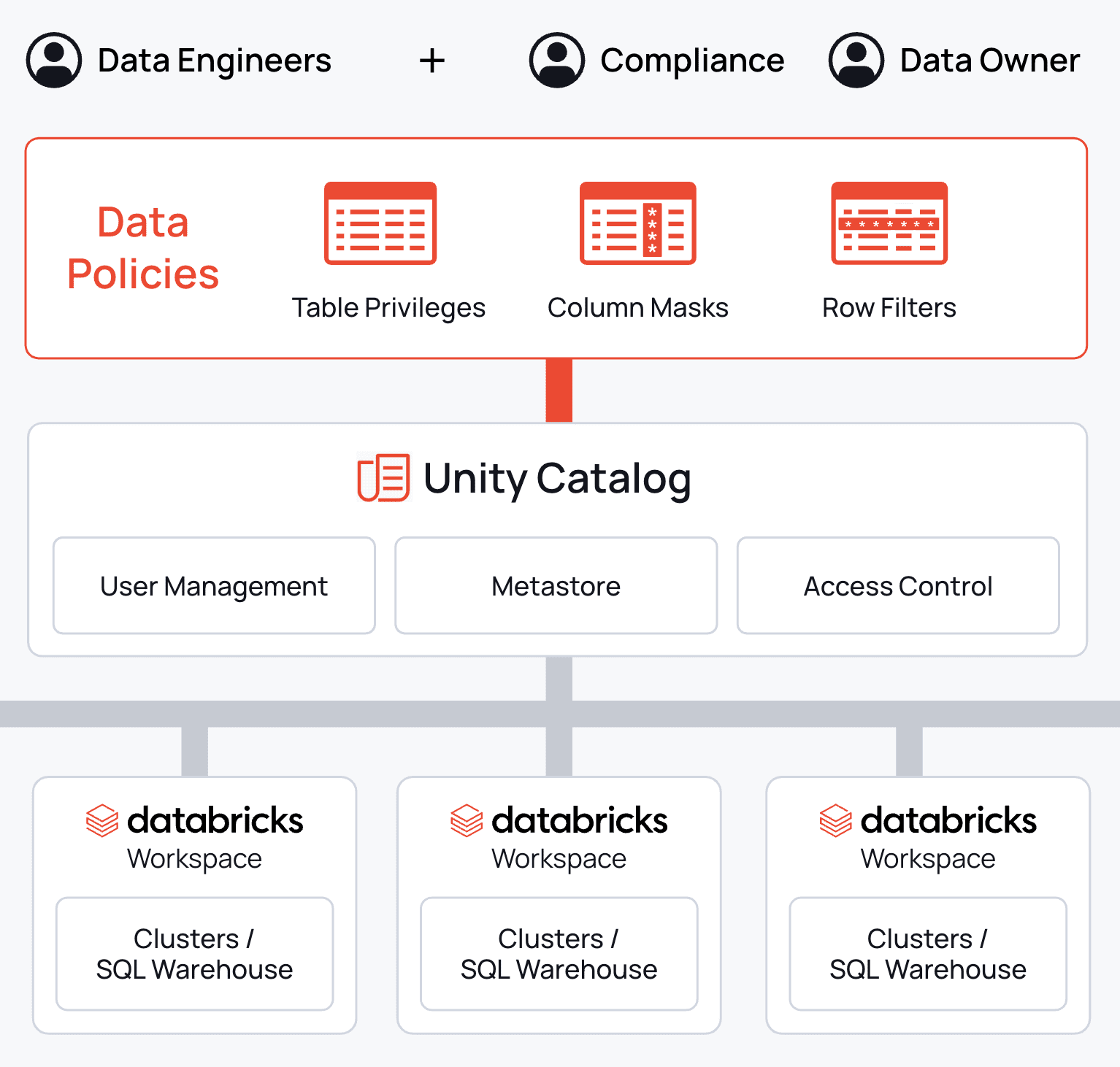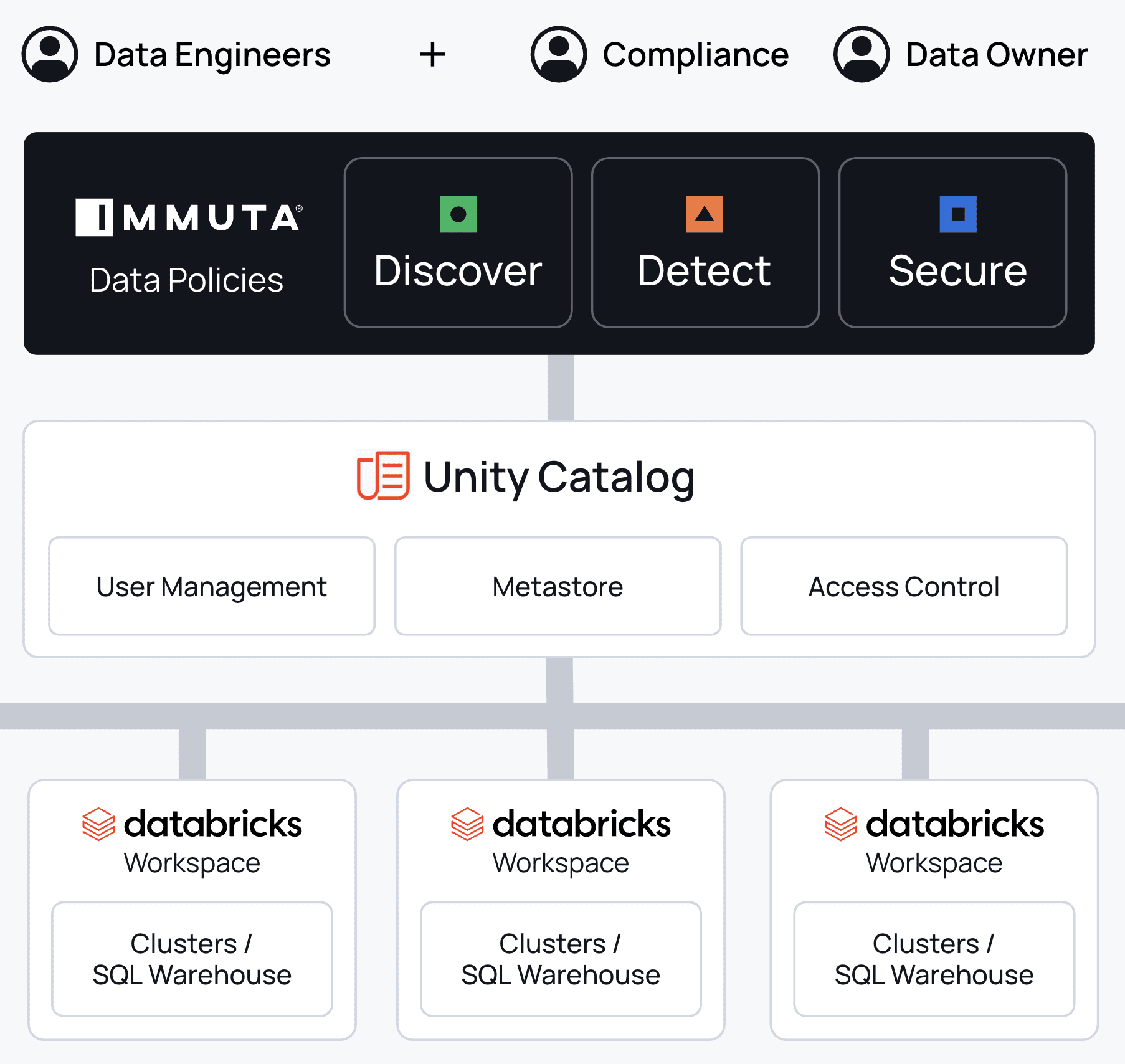If you consider the expression of complex data governance policies, you may have to create many permutations of grants in any given system in order to secure that data based on the business rules defined in the policy. Immuta gives you the ability to model these complex policy statements and apply them at scale powered by Unity Catalog."
Zeashan Pappa, Product Leader – Data Governance, Databricks
Immuta continues to innovate in partnership with Databricks, and we’re excited to announce the general availability of Immuta’s native integration with Databricks Unity Catalog to secure workloads on the Databricks Lakehouse Platform.
With this integration, the Immuta Data Security Platform natively orchestrates security and offers the same user experience across the Databricks Lakehouse Platform using the Unity Catalog enforcement standard. Immuta seamlessly controls access on Databricks clusters and Databricks SQL, and makes it easy for data teams to secure and scale access while accelerating and simplifying operations. This release supports Databricks instances running on AWS and Azure, and more platforms will be supported in upcoming releases.
What is Databricks Unity Catalog?
Databricks Unity Catalog provides a unified governance solution for data, analytics, and AI in your lakehouse on any cloud. With Unity Catalog, data and governance teams benefit from an enterprise-wide data catalog with a single interface to manage permissions, centralize auditing, track data lineage, and share data across platforms, clouds, and regions.

How Immuta Works with Unity Catalog
Immuta’s Databricks Unity Catalog integration simplifies and automates data security and access at scale across Databricks clusters and Databricks SQL. Leveraging Unity Catalog foundational capabilities, Immuta allows users to discover and classify sensitive data, orchestrate data security and access controls, and monitor an organization’s data to ensure proper use and detect risky activity.

Discovering Sensitive Data, Tracking Data Changes, and Centralizing Metadata
Immuta leverages Unity Catalog APIs to monitor for schema and user changes. With its data discovery and tagging capabilities, Immuta enriches metadata to infer additional information like PII, tag data with external information, and in the future, leverage Unity lineage for tag propagation.
Securing Data at Scale
Immuta orchestrates dynamic attribute-based access control (ABAC) policies reflected as native Unity Catalog controls, including table-level security, row-level security, and column masking. This allows for granular access control decisions at query runtime, making policies highly scalable and flexible. And, Immuta is able to achieve this without tags or tag-based masking policies being present in Unity Catalog.
Monitoring Data Activity & Detecting Risks
Immuta Detect offers comprehensive data monitoring and risk management capabilities, including audit logs of user queries, policy enforcement, backing storage, change audits, compliance reports, and user access summaries. In the near future, data teams will have the ability to leverage Immuta’s Unified Audit Model (UAM) service with Unity Catalog. UAM is an enterprise-scale audit service that helps simplify and accelerate the filtering and analysis of audit data by data teams, as well as governance, risk, and compliance (GRC), audit, and security teams.
Key Benefits of Immuta’s Integration with Unity Catalog
Simplify Operations and Enhance Data Security
Immuta has built a time-tested policy engine that is point-and-click, leverages dynamic data access control, and is simple to use with its plain language interface that allows technical and non-technical users alike to build policies.
This approach to access and policy management requires 93x fewer data policies compared to role-based controls, and policies are enforced in real time across teams and regions, all while being out of the data path.

Unlock Data’s Value for Improved Productivity
Immuta helps organizations get 100x faster data access, which translates to improved productivity and speed to insights. With Immuta, more data can safely reside in the cloud, more users can access that data, and more data products can be deployed – all with less risk.
Next Steps
If your organization is using Databricks, chances are that you’re considering incorporating Unity Catalog into your data management strategy. Immuta can help simplify and unlock Unity Catalog’s full value, while bolstering your organization’s data security posture. See step-by-step how it’s done in our joint eBook, Immuta + Unity Catalog: The Next Frontier of Scalable Data Security.
If you want to explore Immuta’s support for Unity Catalog more, schedule a demo with a member of our team.



